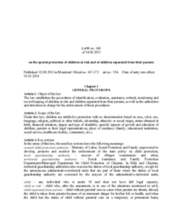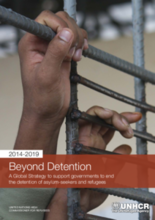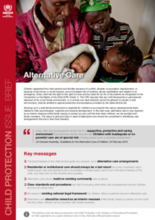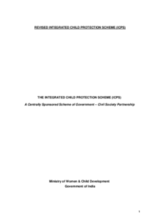Displaying 12361 - 12370 of 14429
Protocole de référence et de prise en charge des enfants non-accompagnés/séparés ou guéris d’Ebola autour du Centre de Traitement Ebola de Wonkifong/Coyah
Cette trousse contient les formulaires d'enregistrement des enfants séparés ou non-accompagnés (UASC) revises et adoptes par Groupe de travail inter-agences sur les enfants séparés ou non-accompagnés ainsi qu'une note d'orientation pour le remplissage des formulaires.
Aujourd’hui un des domaines le plus critique, par rapport aux services à la personne, est celui des interventions auprès de la fragilité des familles avec des enfants mineurs. Les récentes études scientifiques révèlent l’urgence de réaliser des interventions de promotion des relations familiales, afin de prévenir les situations pour lesquelles il n’y a pas d’autres solutions que l’éloignement des enfants mineurs ou, quand cela s’est déjà vérifié, pour favoriser le plus possible la recomposition du noyau familial.
The authors of this article applied a human rights framework using the United Nations Convention on the Rights of the Child to understand what extent children’s basic human rights were being upheld in institutional vs. community- or family-based care settings in Uasin Gishu County, Kenya.
Law No. 140 on the special protection of children at risk and of children separated from their parents entered into force on 1 January 2014.
There is limited information in the child welfare literature on the circumstances and needs of unaccompanied asylum-seeking and refugee children living in the United Kingdom. This article provides insight into the experiences and feelings of these young people by reporting the findings from a narrative-based research project involving 29 unaccompanied asylum-seeking children age 12 to 21 from a variety of African and Asian countries, with the goal of exploring how these children perceived their rights while in private foster care in the UK.
This report, authored by the United Nations High Commissioner for Refugees, calls for a global strategy to prevent the detention of asylum-seekers and refugees in countries around the world, with an initial focus 10+ "focus countries." Among the Strategy's three main goals is the call to end detention of children, which requires a new legal and policy framework, the implementation of the "best interests" principle, alternative and appropriate reception and care arrangements for children (including foster care), and the provision of age-appropriate information to the child.
Une immersion au sein du Réseau Afrique de l'Ouest (RAO) pour la protection des enfants en Afrique de l'Ouest). Ce réseau prend en charge individuellement les enfants vulnérables entre les 15 pays de la sous-région pour les réintégrer socialement et professionnellement.
This issue brief from the UNHCR highlights key messages from UNHCR in regards to alternative care, including the importance of making alternative care arrangements based on the best interests of the child and using residential or institutional care only as a very last resort.
The Integrated Child Protection Scheme (ICPS) of India outlines, and contributes to the implementation of, the Government’s responsibility to establish an effective and efficient child protection system.







